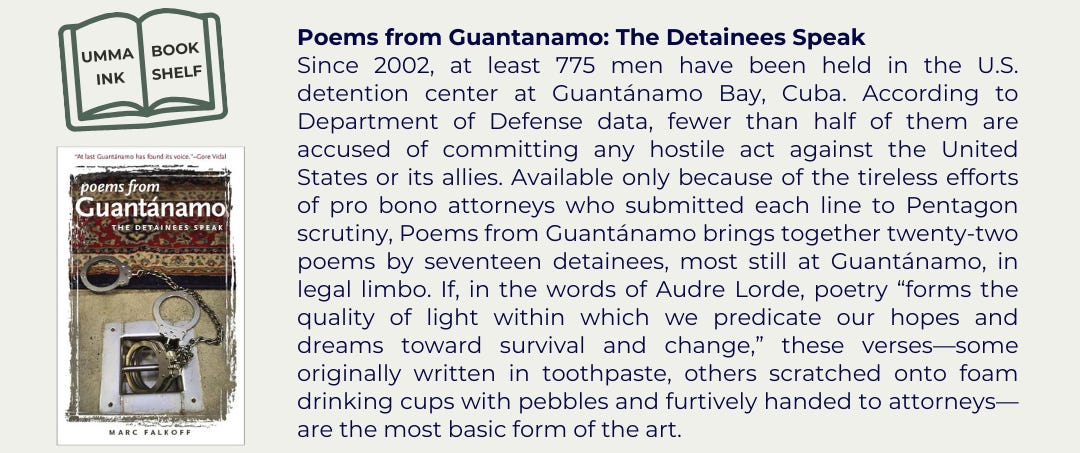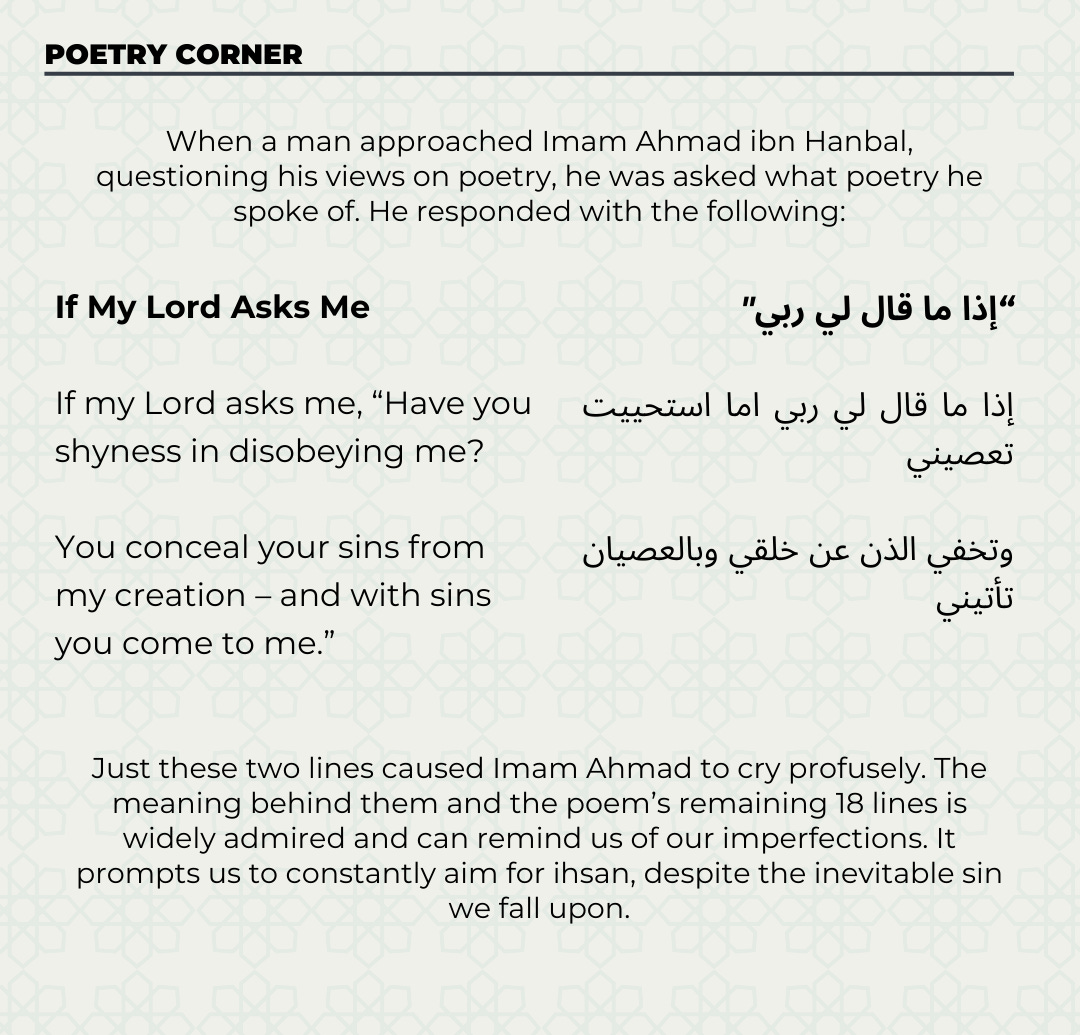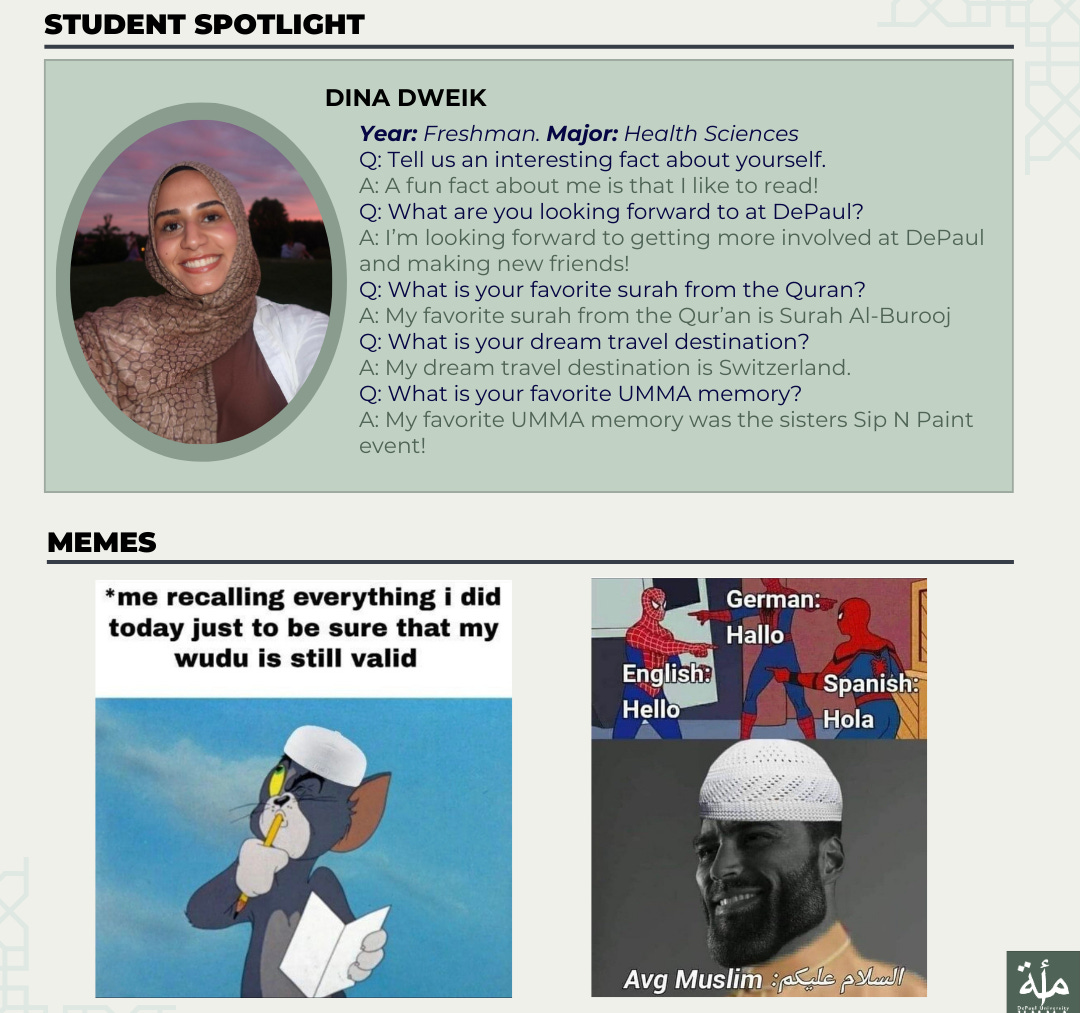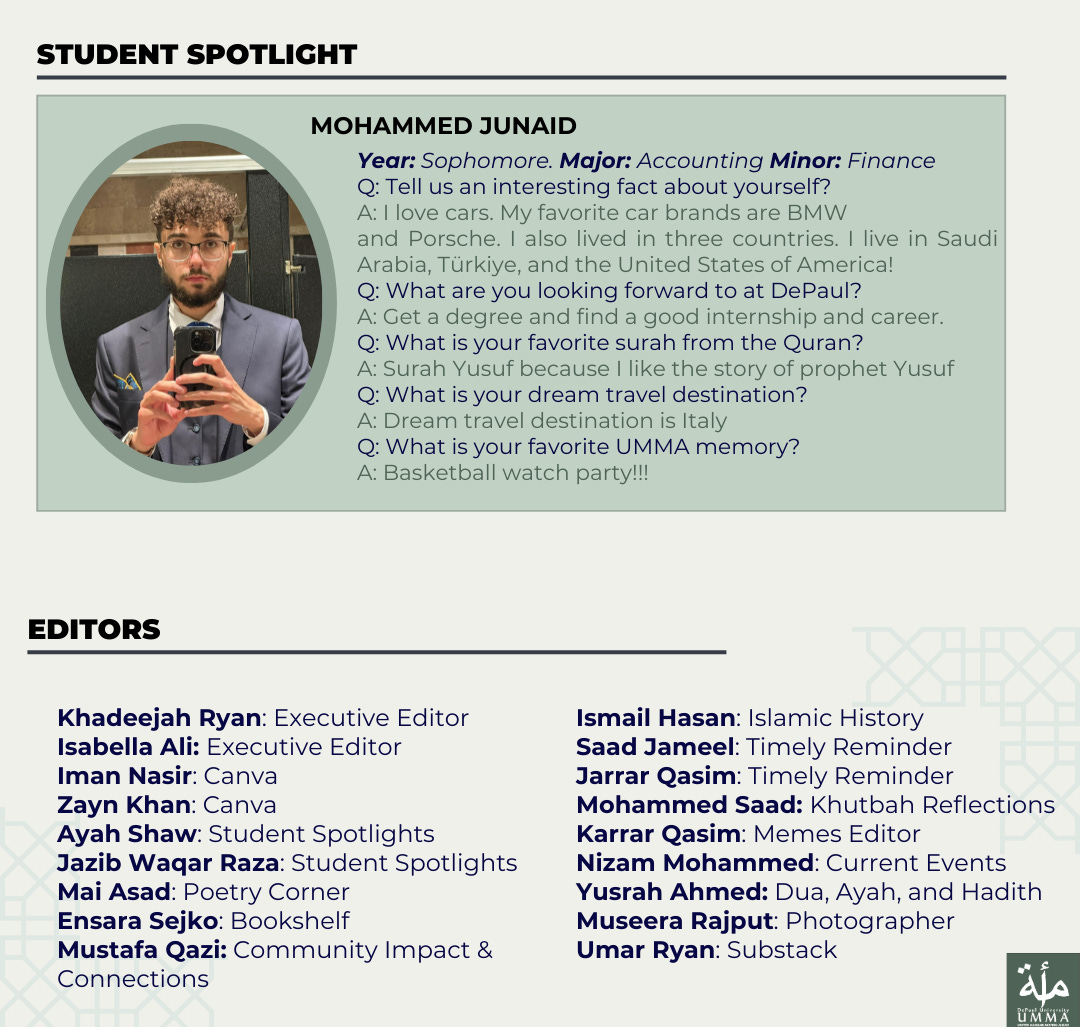Volume 6 Issue 3
As the quarter winds down, take some time to read the third issue of UMMA Ink this year!
Salam everyone! This quarter has gone by so quickly! As everyone is gearing up for the winter, and hunkering down on their studies, we encourage all of you to remember to take moments to relax, breathe, make dua, and do things you love. With the hustle of the world, it is easy to forget to take care of ourselves. So do be mindful and take care!
-The UMMA Ink Team <3
Islamic Timely Reminder
One of the most important concepts in Islam is Muhasabah, which is known as Self-accountability. Muhasabah guides Muslims toward personal and spiritual growth by continuously reflecting on their actions, intentions, and thoughts. Holding oneself accountable encourages Muslims to strive towards aligning their lives closely to the Quran and Sunnah.
Allah SWT says in the Quran, “O you who have believed, fear Allah. And let every soul look to what it has put forth for tomorrow – and fear Allah. Indeed, Allah is Acquainted with what you do” (Quran, 59:18). Muhasabah is a way to fear Allah and prepare for meeting Allah SWT.
The Prophet Muhammad ﷺ said, “The wise man is one who holds himself accountable and performs good deeds to prepare for what comes after death. The foolish man is one who gives into his lowly desires and seeks their indulgence from Allah” (Sunan al-Tirmidhī 2459).
Speaking from personal experience, I have recently started to do Muhasabah through journaling for each day. I would write down if I prayed on time with Sunnah and congregation, and I would also write down if I did other activities like studying, working out, doing my Dhikir, etc. I also would write down if I refrained from any bad habits of mine. I would either check off each category if I did it or put a cross if I didn’t. I would then write an explanation and write about what I need to do going forward. I would say that it has completely changed my life in a beautiful way, and I have noticed myself improving and refraining from many things that I have not done before.
I highly encourage every Muslim to practice Muhasabah through journaling because of its importance that Allah and his messenger ﷺ emphasized, and because journaling is the way of the Salaf (the first and favorite three generations of Muslims).
No matter what form of Muhasabah you do, it should be a cornerstone of your life as Umar ibn al-Khattab R.A. said, “Hold yourselves actcountable before you are held accountable and evaluate yourselves before you are evaluated, for the Reckoning will be easier upon you tomorrow if you hold yourselves accountable today” (Muḥāsabat al-Nafs li-Ibn Abī Dunyā 2).
Ayah
وَيَوْمَ يَعَضُّ ٱلظَّالِمُ عَلَىٰ يَدَيْهِ يَقُولُ يَـٰلَيْتَنِى ٱتَّخَذْتُ مَعَ ٱلرَّسُولِ سَبِيلًۭا
And ˹beware of˺ the Day the wrongdoer will bite his nails ˹in regret˺ and say, “Oh! I wish I had followed the Way along with the Messenger! (25:27)
Dua
رَبَّنَآ ءَاتِنَا فِي ٱلدُّنۡيَا حَسَنَةٗ وَفِي ٱلۡأٓخِرَةِ حَسَنَةٗ وَقِنَا عَذَابَ ٱلنَّارِ
Rabbana atina fid dunyaa hasanatanw wa fil aakhirati hasanatanw wa qinaa azaaban naar
Our Lord, give us in this world [that which is] good and in the Hereafter [that which is] good and protect us from the punishment of the Fire
Hadith
حَدَّثَنَا عَبْدُ اللَّهِ بْنُ يُوسُفَ، أَخْبَرَنَا مَالِكٌ، عَنْ يَحْيَى بْنِ سَعِيدٍ، عَنْ عَبْدِ الرَّحْمَنِ الأَعْرَجِ، عَنْ عَبْدِ اللَّهِ ابْنِ بُحَيْنَةَ ـ رضى الله عنه ـ أَنَّهُ قَالَ إِنَّ رَسُولَ اللَّهِ صلى الله عليه وسلم قَامَ مِنِ اثْنَتَيْنِ مِنَ الظُّهْرِ لَمْ يَجْلِسْ بَيْنَهُمَا، فَلَمَّا قَضَى صَلاَتَهُ سَجَدَ سَجْدَتَيْنِ ثُمَّ سَلَّمَ بَعْدَ ذَلِكَ.
Narrated `Abdullah bin Buhaina:
Allah's Messenger (ﷺ) got up after the second rak`a of the Zuhr prayer without sitting in between (the second and the third rak`at). When he finished the prayer he performed two prostrations (of Sahu) and then finished the prayer with Taslim
Current Events in the Muslim World
Sharp Rise in Anti-Muslim Racism Across Europe Tied to Far-Right Influence and Political Tensions
Muslims across Europe are facing a surge in racism and discrimination, according to a new survey by the EU Agency for Fundamental Rights (FRA). Nearly half (47%) of the 9,600 Muslim respondents across 13 countries reported experiencing racism in the past five years, an increase from previous surveys. The rise in anti-Muslim sentiment has been linked to the growth of far-right movements, such as Austria’s Freedom Party (FPÖ) and Germany’s Alternative für Deutschland (AfD), alongside escalating political tensions after the October 7 Hamas-Israel conflict. Discrimination extends into key areas like housing and employment, with young Muslims and women wearing religious attire facing the highest levels of prejudice. The FRA is urging EU member states to implement stronger measures to combat hate crimes and collect better data to drive meaningful progress. (The Guardian)
CNN Bans Conservative Writer After Controversial Comment to Muslim Panelist
CNN has banned conservative writer Ryan Girdusky following a fiery exchange on News Night, where he told Muslim commentator Mehdi Hasan, “I hope your beeper doesn’t go off.” Hasan took the remark as a reference to a deadly 2024 Hezbollah-linked incident involving exploding communication devices, interpreting it as a threat. The panel had initially been discussing Donald Trump’s rally at Madison Square Garden, which featured racist remarks and inflammatory language. Tensions escalated when Girdusky accused Hasan of being called an anti-Semite more frequently than anyone else on the panel. Host Abby Phillip criticized the comment as “out of pocket,” and Girdusky was removed during a commercial break. CNN later confirmed that Girdusky was banned from the network, reinforcing its zero-tolerance policy toward racism and bigotry. In response, Girdusky took to X (formerly Twitter), accusing CNN of double standards, saying, “You can stay on CNN if you falsely call every Republican a Nazi, but not if you make a joke.” (US News)
Israel’s Ban on UNRWA Marks Escalation in War with the UN, Palestinian Envoy Warns
The Knesset’s approval of legislation to ban the United Nations Relief and Works Agency for Palestine Refugees (UNRWA) from operating in Israel has ignited strong condemnation. Palestinian envoy Riyad Mansour denounced the move during a UN Security Council meeting, calling it a “new level” in Israel’s ongoing conflict with the UN and part of an intensified assault on Palestinian people. UNRWA, which provides essential services to millions of Palestinian refugees, has already suffered significant losses during the ongoing conflict in Gaza, with hundreds of staff members killed and two-thirds of its facilities damaged. While Israeli officials argue that UNRWA promotes anti-Israeli sentiment and aligns with Hamas, many countries and human rights organizations have criticized the ban as collective punishment. UNRWA head Philippe Lazzarini described the ban as a “dangerous precedent,” and there are growing calls at the UN General Assembly to hold Israel accountable. (Al Jazeera)
Khutbah Reflections
True blessings lie in every moment of life—whether in ease or hardship—and that faith, gratitude, and community transform even our struggles into sources of strength and spiritual growth.
I am reminded of the depth and significance of blessings in both moments of ease and hardship. The khutbah opens with praise for Allah, who is the source of all blessings, and reminds us of the mercy embodied in the life of the Prophet Muhammad (peace be upon him). Abu Noor’s recounting of the Prophet’s close relationships with his companions, particularly with individuals like Abu Hurairah, illustrates how true companionship goes beyond social status, offering spiritual and emotional support.
The khutbah further illuminated how blessings often accompany hardship. I found this message relevant to my own life, as it reframes difficult times not as misfortunes but as moments ripe for growth and deeper reliance on Allah. Abu Noor drew from Surah Al-Duha to emphasize that even during the most challenging times, Allah’s blessings are present, urging us to remain patient and trust in His wisdom.
One of the most powerful aspects of the khutbah was the explanation of Barakah—a type of blessing that transcends physical abundance and includes emotional well-being and spiritual fulfillment. Abu Noor’s reminder to cultivate a Mubarak (blessed) space in our lives, particularly on campus, encouraged me to foster positive connections and contribute to an environment that uplifts others. This reflection has given me a deeper understanding of how small acts, like showing kindness or engaging in prayer, can turn any space into a source of blessings for everyone involved.
In summary, the khutbah calls for gratitude, reliance on Allah, and the creation of spaces that promote faith and community, principles that are essential for navigating both personal challenges and the collective life on campus.
Islamic History
The Legacy of Al-Andalus: A Cultural Tapestry
For nearly 800 years, the Iberian Peninsula, known as Al-Andalus, was a vibrant center of Islamic culture. From the 8th to the 15th centuries, this region witnessed a remarkable flourishing of art, architecture, literature, and science.
Cordoba, the capital of Al-Andalus, became a renowned center of learning, rivaling Baghdad in its intellectual pursuits. The Great Mosque of Cordoba, with its stunning arches and intricate mosaics, stands as a testament to the architectural prowess of the era.
Al-Andalus was also a place of great religious and cultural tolerance, where Muslims, Christians, and Jews coexisted and exchanged ideas. This intellectual exchange led to significant advancements in various fields. Scholars like Averroes made significant contributions to philosophy and medicine, while figures like Ibn Arabi mystical poetry left a lasting impact on Sufi thought.
The legacy of Al-Andalus is deeply woven into the fabric of Spain and Portugal. Its influence can be seen in the region's architecture, music, cuisine, and even language. Exploring the history of Al-Andalus offers a fascinating glimpse into a period of cultural exchange and intellectual dynamism that shaped the course of European history.







